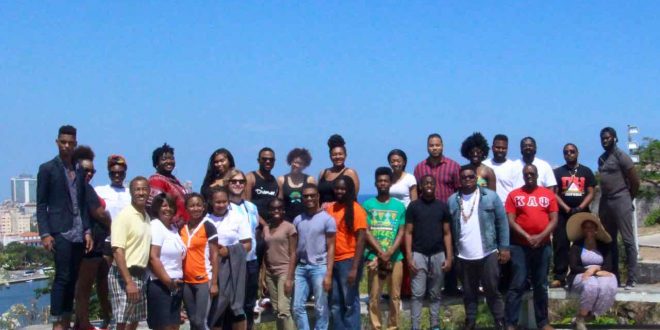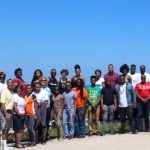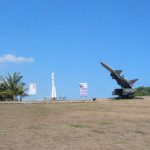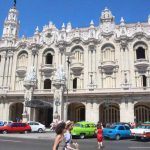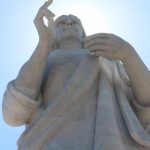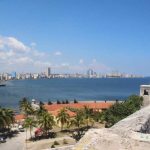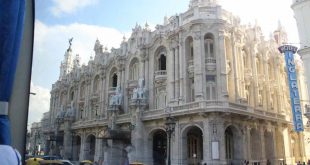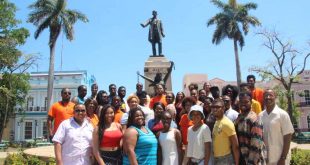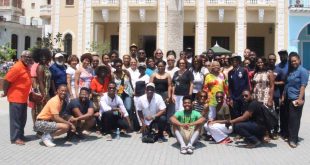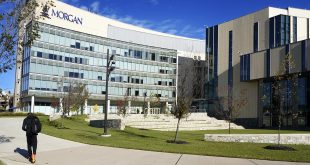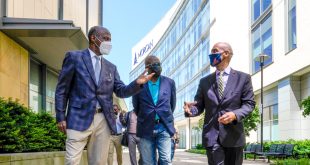Today was the Morgan State University Choir’s final day in Cuba! Typically, our international tours have been at least ten days; however, we chose to have a shorter stay in Cuba, given the relative newness of the rekindling of American-Cuban relations. We checked out of our hotel at 9:30 a.m., hoping to see as many additional Cuban points of interest as possible.
We first went to the Havana Capitol building, constructed in 1929. It appears to be a replica of the U.S. Capitol building in Washington, DC. Our guide told me that when the building was constructed, it was controversial because of the economic condition of the world, close to the period of the Great Depression. In retrospect, however, the structure is now considered a worthwhile project, as one can see the capitol dome from any part in Havana and it is the most visible landmark in the city. We also returned to the Grand Theatre of Havana, which happens to be adjacent to the capitol building. These structures are located on Havana’s Paseo del Prado. The Prado was designed to have hotels, restaurants, and upscale residences around a boulevard similar to the European cities of Madrid and Paris.
We then visited the Cuban Missile Crisis outdoor museum. Many artifacts were displayed from that tense period between our two countries, circa 1962.
A few years ago, we toured Brazil and visited the famous Christ of the Redeemer statue. Havana has a similar structure entitled Cristo de La Habana (Christ of Havana). Next to this structure was one of the homes of Che Guevara, the Argentinian first commander of the revolution after Fidel Castro.
We then visited the La Cabaňa, an 18th-century fortress complex, which was placed on the elevated eastern side of the harbor entrance in Havana. We were able to enjoy breath-taking views of the Havana skyline.
Knowing that we should eat before checking in at the airport, we stopped for one more Cuban meal, hearing more great Cuban music. This time, rather than three men, there were four women performing.
We arrived at the Havana airport with plenty of time to spare. My greatest concern as group-leader of young people, is making sure that everyone has possession of their travel documents to leave the country, including their passport, visa, and actual charter airline paper ticket. Everything seemed to be in order. The airport was so very small that it only took minutes to pass through security, similar to other, smaller Caribbean airports. We all had to walk on the runway to board our plane. Most were looking forward to the complimentary Wi-Fi on the flight. Once in the air, we all could exhale in anticipation of returning to the United States.
We now know that Cuba was a good destination choice for this year’s tour. We knew the music was going to be extraordinary, as Cuban musicians enjoy a great reputation. We also believed the food would be good, as the climate is conducive to growing many different types of food year-round. One thing that impressed me was the genuine kindness of all the Cuban people who directly associated with us. It was as though everyone in the country was told to be as kind to visitors (Americans) as possible, although I am sure this was not the case. From the person on street that you would casually pass by, to people that had a vested interest in your visit, everyone smiled warmly and truly made us feel welcome. With interactions like this, Europeans will not be the only ones travelling to Cuba on holiday. We all wanted to visit Cuba prior to the big changes that are inevitable in the coming years – before capitalism, commercialism, and Americanism infect their culture. During this tour, we were able to see Cuba, unscathed by the tainting that only money can influence. We feel blessed to have exchanged culture in such a grand way.
Cuba is becoming a very popular destination. While we were in Cuba, Baltimore’s own mayor, Stephanie Rawlings Blake was in Havana for a Mayor’s conference. Also, the Association of Black Lawyers had a conference in Cuba while we were there. Also, Tom Joyner invited several HBCU presidents to caucus in Cuba to discuss how HBCUs might help Afro-Cubans to come to the US for their formal education. Yes, President Obama was correct in relaxing our sanctions against Cuba. Americans are beginning to return to Cuba to experience the culture of a community that has a great deal to offer, and close enough for Americans to easily enjoy.
I believe the Morgan State University Choir beyond representing the United States and Morgan State well, through our performances helped to take Cuban-American relations to even higher heights. Fair Morgan!
 Morgan State University Newsroom Morgan State University
Morgan State University Newsroom Morgan State University
